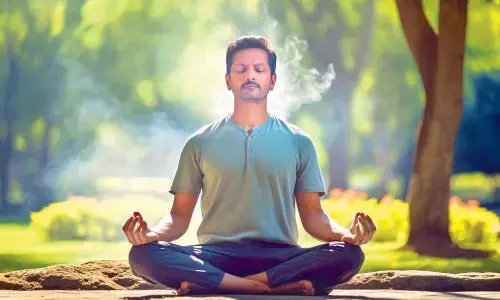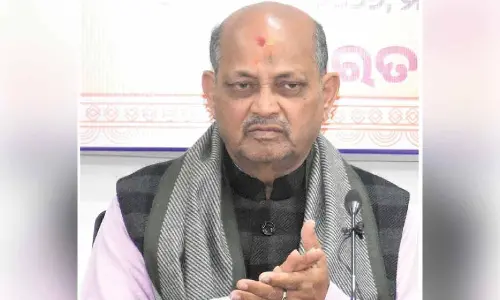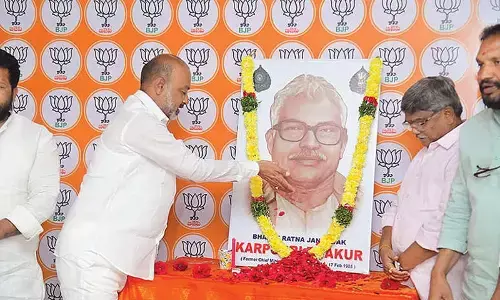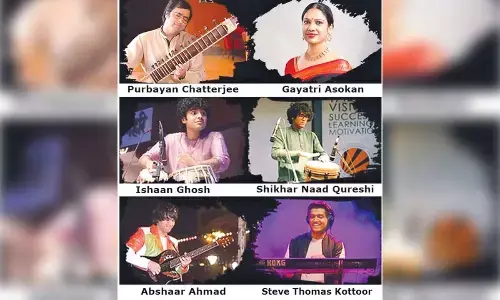Governors aren't rubber stamps
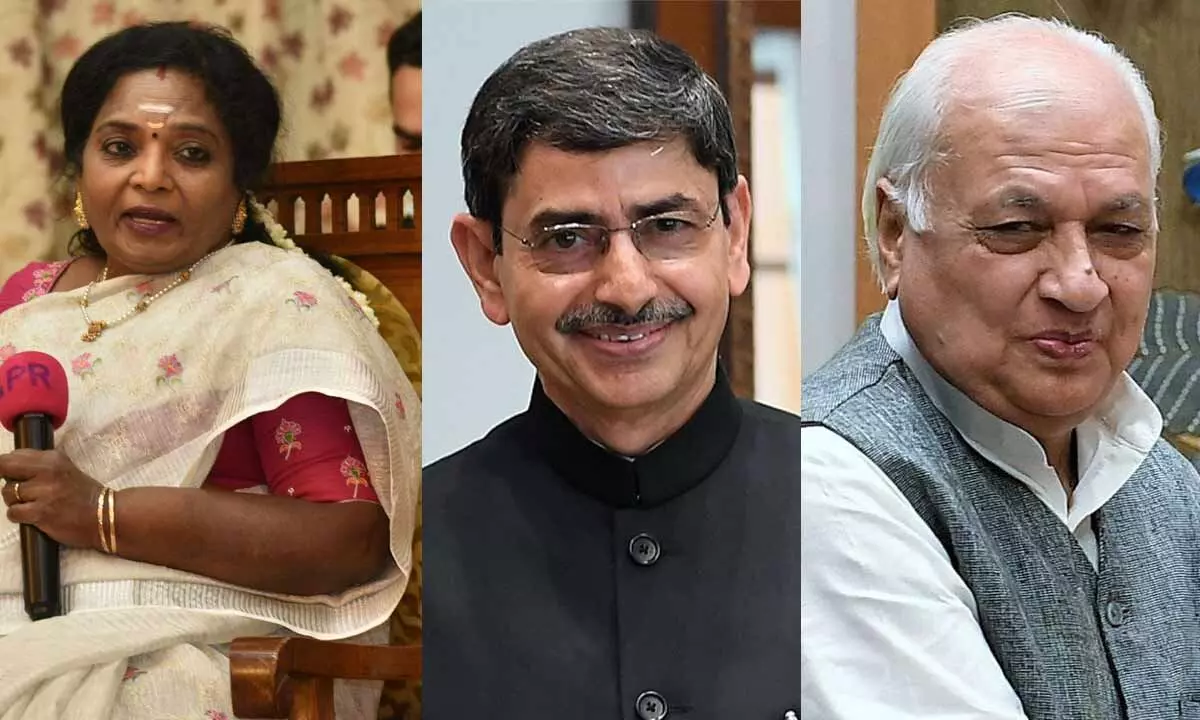
Tamilisai Soundararajan, RN Ravi and Arif Mohammed Khan
The Southern states are witnessing a disturbing trend wherein the run-ins between state governments and Governors are escalating
The Southern states are witnessing a disturbing trend wherein the run-ins between state governments and Governors are escalating. Telangana Governor Dr Tamilisai Soundararajan has alleged that an "undemocratic situation" is prevailing in the state where the state government is intruding into her privacy and tapping her phones. Tamil Nadu sought recall of Governor R N Ravi. Kerala proposes to take the ordinance route to replace Arif Mohammed Khan as the Chancellor of state varsities.
Why is all this happening and more so in Southern States? Are the ruling dispensations in the non-BJP states becoming more and more politically intolerant or do they want to fire their guns over the shoulders of these Governors? The face-off between the ruling parties and the Governors had gone to the extent of all and sundry indulging in verbal attacks on the people in gubernatorial positions and giving new definitions to the role of the Governors.
In the process, even basic protocols are not being followed. The governments accuse the Governors of acting as agents of Centre. Even the officials who in administrative parlance are known as public servants have started ignoring the instructions of the Governor and have stopped responding to their requests. In Telangana, the District Collectors and the SPs do not go to receive the Governor when she visits the districts.
The ruling dispensations seem to believe that the Governors are 'rubber stamps' and should blindly sign on the dotted lines. A new tendency that has emerged particularly in the last one decade is that no one should question them. If they do so, the rank and file will be after them. The unfortunate situation is that even an official visit of the Prime Minister gets highly politicised and all kinds of flexies and banners like "No Entry" have sprung up. There seems to be terrible mix-up of politics and governance.
We have the left parties who refuse to see or recognise anything that is positive. They want to survive on negativism and do not hesitate to attribute motives to Raj Bhavan. There are some honourable Members of Parliament who swear by the Constitution and say that the Governor must blindly sign on any note sent by the government or any resolution that is passed by the Assembly or the cabinet. According to them, that is what the Constitution says. God save the country.
According to legal experts, "Article 200 says when a Bill passed by the Legislature of a State is presented to the Governor, he/she has four options, namely, (a) give assent to the Bill; (b) withhold assent; (c) reserves the Bill for the consideration of the President; or (d) he returns the Bill to the Legislature for reconsideration."
"The first proviso says that as soon as the Bill is presented to him, he may return the Bill to the Legislature (if it is not a Money Bill) together with a message requesting the Legislature to reconsider the Bill. He can also suggest the desirability of introducing such amendments or changes as he thinks appropriate. If, on such reconsideration, the Bill is passed again, with or without amendments, and is presented to the Governor for assent, he must accord his assent."
"The second proviso says that if the Bill presented to him derogates, in the opinion of Governor, he can reserve the Bill for the consideration of the President. It also does not fix any time limit for granting the assent or for declaring that he is withholding his assent or reserving it for the assent of the President. Purshothaman v. State of Kerala (AIR 1962 SC 694) says that there is no time limit for granting the assent."
The Constitution does not furnish any guidance to the Governor in which matters he should accord his assent, and in which matters he should withhold assent.
This being the situation, it is disgusting to see the kind of political atmosphere that is being created in the southern states. If there is difference of opinion, the heads of the government can sort it out through dialogue but that does not happen. It seems that all political parties more so the regional satraps go in for making every issue as prestige issue and may be it is the high levels of egoism that prevents any dialogue between the government and the Governors. This naturally would prick the Governor, particularly when acts of administration amount to insult them. Governors who are from political background and are active refuse to agree to every decision of the state government.
The state government has every right to differ with the stand taken by the Governor. But why clash, why not hold talks and resolve the issues. We have seen how the issue of constituting a common recruitment board bill was almost resolved on Thursday following the discussion Education Minister Sabitha Indra Reddy and her team of officials had with Tamilisai Soundararajan, though this too had its own share of friction between the Governor and the government.
Another new trend that is emerging is that the regional parties threaten to hold protests in front of Raj Bhavan if the Governors do not give assent to the bills sent by state government. Such threats were issued in Telangana and Kerala as well.
The ruling Communist Party of India (Marxist) in Kerala announced that a massive protest would be held in front of Raj Bhavan on November 15 at Raj Bhavan. The state government's move comes amid an ongoing power tussle with the governor over functioning of universities, including appointment of Vice-Chancellors. The Kerala government alleges that Governor was an agent of RSS.They claim he does not have the authority as chancellor to demand the resignation of VCs
Khan had challenged" the state government to barge into his office or attack him on the road. He said the government was biased against him and has accused the government of encroaching on the powers of the Governor. In fact, since Arif Mohd Khan became the Governor of Kerala, there were number of run ins between him and the government. The CM even wanted to bring an ordinance to replace Governor as Chancellor.
In Tamil Nadu, the ruling DMK wants that the Governor R N Ravi be recalled alleging, among others that he "instigated communal hatred. The members of the MK Stalin led alliance government signed a memorandum and submitted it to the President. They alleged that the Governor was sitting on bills including the one seeking exemption to the state from the ambit of NEET medical exam. The DMK government has been at loggerheads with Ravi on many issues. The governor had recently expressed his displeasure over the government not handing over the October 23 Coimbatore car explosion to NIA. This did not go well with the government.
The government alleged that Ravi was "unabashedly propagating dangerous, divisive, religious rhetoric in public, which is unbecoming of a Governor and that his speeches cold incite hatred and create communal unrest.
In the past too there were allegations against some governors, but this kind of war was not there. There would always be certain differences between the state governments and the Governors, but it does not mean that statements demeaning Raj Bhavan or the office of the governor are made by the politicians. The state government too should not do anything to violate the protocols. If the state government follows this, then it would have upper hand.
The 'Tu Tu Mein' between state governments ruled by regional parties and the Centre has reached a stage where the CMs have started keeping themselves away even from the official functions of the PM in their respective states. This is not a healthy development in democracy. Political differences should not be mixed with governance of developmental issues. The most serious issue that everyone needs to ponder over is the issue of using foul language and calling names and claiming that those words were not derogatory and that it was popular local lingo. If heads of countries like India and Pakistan can meet at various International Conferences, why cant a CM share the dais with PM during officials functions?
Whatever it may be, both the Centre and States need to separate politics from Governance and Development. What is more is that even analysts have started taking sides. They come up with articles reflecting their political leanings. If they must take a line instead of giving impartial analysis, then they should not call themselves as analysts. They should be part of the PR team of the government or the party in power.
Its high time the political parties give up this one upmanship attitude and draw clear line between politics and governance.










